Imperfect Union
A Fathers Search for His Son in the Aftermath of the Battle of Gettysburg
Chuck Raasch
Stackpole Books
Lanham Boulder New York London
Published by Stackpole Books
An imprint of Globe Pequot
Trade Division of The Rowman & Littlefield Publishing Group, Inc.
4501 Forbes Boulevard, Suite 200, Lanham, Maryland 20706
Distributed by
NATIONAL BOOK NETWORK
800-462-6420
Copyright 2016 by Chuck Raasch
All rights reserved. No part of this book may be reproduced in any form or by any electronic or mechanical means, including information storage and retrieval systems, without written permission from the publisher, except by a reviewer who may quote passages in a review.
British Library Cataloguing in Publication Information available
Library of Congress Cataloging-in-Publication Data
Names: Raasch, Charles, author.
Title: Imperfect union : a fathers search for his son in the aftermath of the Battle of Gettysburg / Charles Raasch.
Description: Lanham, Maryland : Stackpole Books, 2016. | Includes bibliographical references and index.
Identifiers: LCCN 2016012456 | ISBN 9780811718936 (hardcopy)
Subjects: LCSH: Wilkeson, Bayard, 18441863. | Wilkeson, Samuel, 18171889. | Gettysburg, Battle of, Gettysburg, Pa., 1863Biography. | Fathers and sonsNew York (State)BuffaloBiography. | War correspondentsNew York (State)BuffaloBiography. | United StatesHistoryCivil War, 18611865Casualties. | Battle casualtiesPennsylvaniaGettysburg. | Buffalo (N.Y.)Biography.
Classification: LCC E475.53 .R223 2016 | DDC 974.7/904092 [B] dc23 LC record available at https://lccn.loc.gov/2016012456
 The paper used in this publication meets the minimum requirements of American National Standard for Information SciencesPermanence of Paper for Printed Library Materials, ANSI/NISO Z39.48-1992.
The paper used in this publication meets the minimum requirements of American National Standard for Information SciencesPermanence of Paper for Printed Library Materials, ANSI/NISO Z39.48-1992.
Contents
Introduction
The Probable Truth
Two years after the battle of Gettysburg, Atlantic Monthly magazine correspondent J. T. Trowbridge visited the most famous battlefield in America. He had become an expert at picking through the great and terrible aftermath of the Civil War. Trowbridge spent that summer and fall of 1865 walking through the landscape where armies had clashed, passing through towns and fields scoured and scarred by four years of war. The next year, his book, The South: A Tour of Its Battlefields and Ruined Cities , gave voice to the scores upon scores still reeling in the wars wake.
That aftermath is the truest legacy of war. Tales of heroism on the battlefields are told most vividly, and most often. But what is put back together from the pieces of shattered lives, after the guns go silent, becomes the forever.
This book is primarily about two people, a war correspondent and his son, in the great aftermath of the greatest battle on American soil. How they arrived there at that tumultuous rendezvous, and how they got caught up in the great tributaries of suffering that flowed from it, is the story of Gettysburg that still unfurls.
Correspondent Trowbridge was initially surprised at how quiet the town of Gettysburg was that summer of 1865, two years after the battle. He arrived on a soft and peaceful summer day. Only the natural symphony of locusts and the perpetual click of the stone cutters, at work on the granite headstones of the cemetery, interrupted the sultry summer tranquility. Yet there was an extra heaviness in the air, as if it was about to burst with lively reminisces of those terrible times. Townsfolk were reticent to unleash one memory, lest it turn into two and then into too many, inflicting another fresh searing of souls and senses from the rages of three days of 1863.
Trowbridge arrived at the cemetery that Abraham Lincoln had dedicated with his famous speech four and a half months after the battle, the speech in which Lincoln lauded brave men for consecrating the fields with that final full measure of devotion. The graves of more than 3,500 Union soldiers stretched out before Trowbridge on a plump knoll. They were spaced 2 feet apart sloping gently to the killing valleys around them, grave upon grave, story upon story, memory upon memory. New granite stones were still being installed to mark them, and as the monument workers dug into the rocky Pennsylvania ground to anchor fresh headstones, Trowbridge caught glimpses of coffins or remains of men buried just beneath the surface. It was as if the first layer of history was being peeled back and exposed again to the never-ending pain and loss of those three days, and to the questions the multitudes had left behind. The tranquility that Trowbridge first felt had simply masked a bottomless sense of loss. At that moment Trowbridge recognized that the aftermath of Gettysburg would last forever, and not in the way that history records winners and losers, or in the tales of old soldiers glorifying their actions.
The spectacle of so large a field crowded with the graves of the slain brings home to the heart an overpowering sense of the horror and wickedness of war, Trowbridge thought.
A great weight of questions burdened him. Why did these men end up here, each of whom had his interests, his loves, his darling hopes, the same as you or I. All were laid down with his life. It was no trifle to him, it was as great a thing to him as it would be to you, thus to be cut off from all the things dear in this world, and to drop at one into a vague eternity.
No trifle indeed, in these last, full measures of devotion. The toll their deaths exacted could not be counted just by the long casualty lists that ate up column after column in newspapers over the wars four long years. How had their families persisted and coped with that vague eternity that had stolen their loved ones? Had this man or that man died alone, or amidst the great wash of humanity that descended on Gettysburg in the days after the battle? Were they touched by the unknowable heroes of that second great invasion, those rivers of mercy that flowed over Gettysburg after the armies left their grim harvest behind? Or did they die alone in their own thoughts?
Why does war demand heroes? Is it because that believing the alternativethat people died on these fields because it was the only way to kill the arrogant and utter debasement of slaveryis unfathomable amid sacrifice and destruction on the Civil Wars scale? Why is rationalization necessary at all when civilization has been shaped by conflict since its dawn?
We indulge in pious commonplaces, They have gone onto a better world, they have their reward, and the like, Trowbridge wrote. No doubt this is true; if not, then life is a mockery, and hope a lie.
Hope a lie? Life a mockery? Questions left for the survivors. Irrelevant questions for the memory of the men lying in the ground at Trowbridges feet. To Trowbridge, they confronted for their country that awful uncertainty of death.
Did they believe in your better world? he asked. Whether they did or not, this world was a reality, and dear to them.
Volumes have been dedicated to the first three days of July 1863, to the hand-to-hand struggles on Little Round Top and Culps Hill and Cemetery Ridge, to the point-blank slaughter in the peach orchard and railroad cut. They have been embedded in the history of Americas seminal conflict. This book is not just about heroes on the battlefield. It is a story about the arduous, terrifying roads to the battle; about the reporters who were following the armies and the war correspondent profession they were inventing on the run; about the suffering that flowed from the battle for days, months, and in the years afterward; and about the struggles to find loved ones and peace in the eternal aftermath. When the soldiers left, a fresh civilian army numbering in the thousands descended upon the suddenly famous villageor infamous, depending on which direction you were looking upon it from. This second great invasion of Gettysburg, these legions of the aftermath, produced heroes and villains of a different kindbut just as meaningful, often just as courageous, as any sword-wielding hero on the field of fight.
Next page
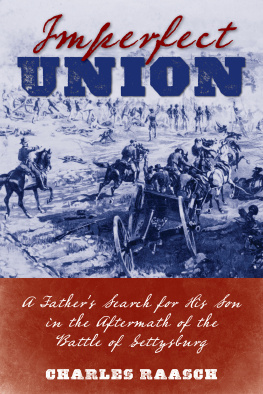
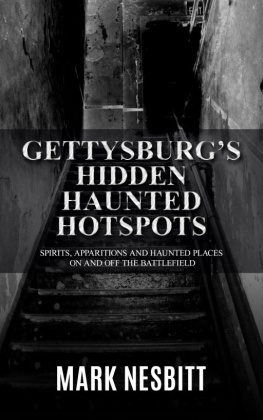
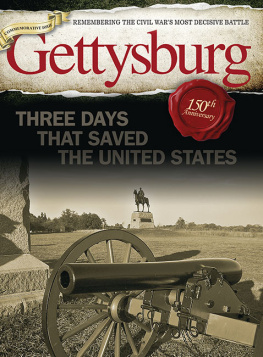
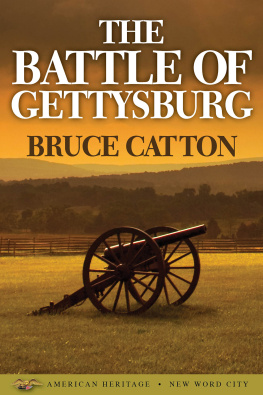
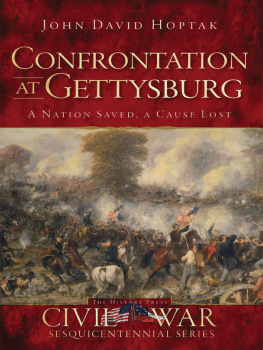
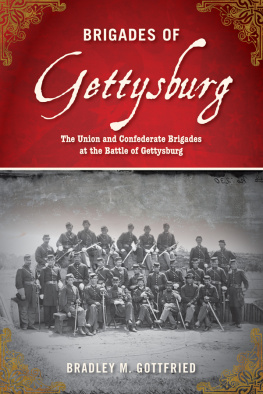
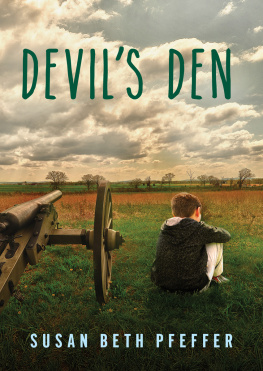

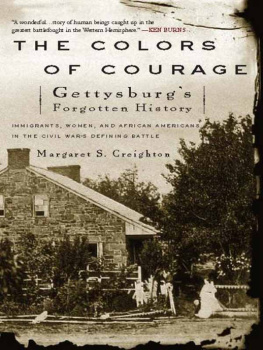
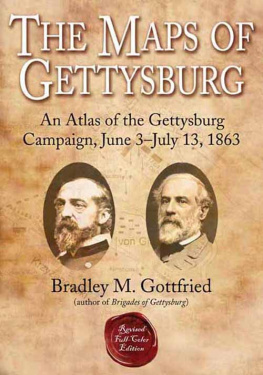
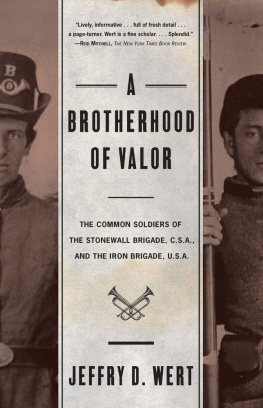
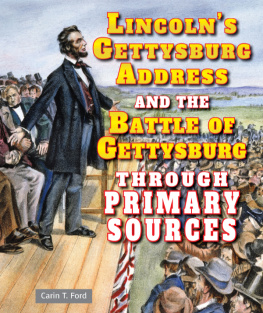
 The paper used in this publication meets the minimum requirements of American National Standard for Information SciencesPermanence of Paper for Printed Library Materials, ANSI/NISO Z39.48-1992.
The paper used in this publication meets the minimum requirements of American National Standard for Information SciencesPermanence of Paper for Printed Library Materials, ANSI/NISO Z39.48-1992.